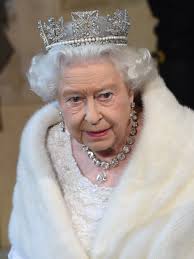Nnamdi Kanu, Guantanamo Bay Detainees and British Government’s Lethargy On Kanu’s Case
 |
| Queen Elizabeth |
 |
| David Cameron |
In October 30, 2015, a suspected
al-Qaeda member, Shaker Aamer, a Saudi and British citizen who was captured in
Afghanistan in 2001 and brought to Guantanamo Bay, Cuba, in 2002 was released
by the United States government following pressure from the British government.
He had left prison on a plane
chartered by the British government, touching down at London’s Biggin Hill
airport. British broadcasters covered the landing. Shaker Aamer was released on
the ground that he was being allegedly tortured, his rights violated by
American officials manning the detention camp at Guantanamo. As a matter of
fact, Aamer was the last of 16 British passport holders released due to British
government’s continuous pressure on United States from the George Bushes to Barack
Obama for their release.
The other British passport holders
captured in combat and released from Guantanamo include Moazzam Begg, Feroz
Abbasi, Shafiq Rasul, Asif Iqbal, Ruhal Ahmed, Jamal Abdullahi Kiyemba, Richard
Dean Belmar, Martin Mubanga, Omar Deghayes, Jamil El-Banna, Bisher al-Rawi,
Binyam Mohammed, Ahmed Errachidi.
It is apparently because of the way
that Britain fought for the release of its citizens who some of them were
caught fighting for al-Qaeda that may have informed the decision of the leader
of the Indigenous People of Biafra (IPOB) Mr Nnamdi Kanu, who is also a British
citizen, to call on the British government to demand for his release. Already
some IPOB members in UK are said to have made his detention a political issue
at the parliament in Britain. It is
believed that if Britain could seek the release of well-known Jihadists from
Guantanamo, it would be easy to effect Kanu’s release since IPOB is not a terrorist
organisation like al-Qaeda or Boko Haram that embark on mindless killing of
innocent people who did not agree with their ideology.
Many observers had wondered why
Britain had not shown much interest over Kanu’s detention by Nigerian
government. Perhaps Kanu’s letter to the British government would bring Her
Majesty’s Government out of its lethargy on the matter.
Nnamdi Kanu’s letter to Her Majesty’s
Government through his lawyers demanding her intervention for his release reads
in part: “It is
repeating the obvious to state that our client is a full British citizen, by
virtue of which position he is entitled to all Rights, Privileges and
Protection, guaranteed under the British Laws and conventions.
“We are therefore constrained in the circumstance, to formally notify the British Government via this medium, of our well informed reservations, and apprehension, that our client is undergoing persecution in the charge above referred, and deliberate design by the persecutors to frustrate every effort of the Defence team aimed at giving our client a fair trial.
“We are therefore constrained in the circumstance, to formally notify the British Government via this medium, of our well informed reservations, and apprehension, that our client is undergoing persecution in the charge above referred, and deliberate design by the persecutors to frustrate every effort of the Defence team aimed at giving our client a fair trial.
“It is
the position of our Law, that dual citizenship is a constitutional right of the
citizens of Nigeria, clearly provided for under section 28 of the 1999
Constitution of the Federal Republic of Nigeria as amended in 2011. Dual
citizenship is not a crime under our Law. Our reservations on the President’s
comment was underpinned by the findings made in the ruling delivered on
February 29, 2016, by Hon. Justice John Tsoho, wherein our client and the two
other defendants were denied bail. “Recalled that on December 29, 2015, during
the Presidential Media Chat, the President told the whole world that Nnamdi
Kanu cannot be granted bail, alleging that he came into the country without a
valid travelling passport. “This pronouncement was roundly condemned by both
local and international commentators. His pronouncement was viewed as a clear
usurpation of the functions and powers of the judiciary. “Though very
regrettable and extremely unfortunate, Nnamdi Kanu was refused bail on January
29, 2016. In refusing him and other defendants bail, the court also cited the
facts of his possession of dual passports as a flight risk, and as such held
that he cannot be granted bail in line with the pronouncement of the President
of the Federal Republic of Nigeria in his media chat telecasted live on
December 29, 2015.”

Comments
Post a Comment